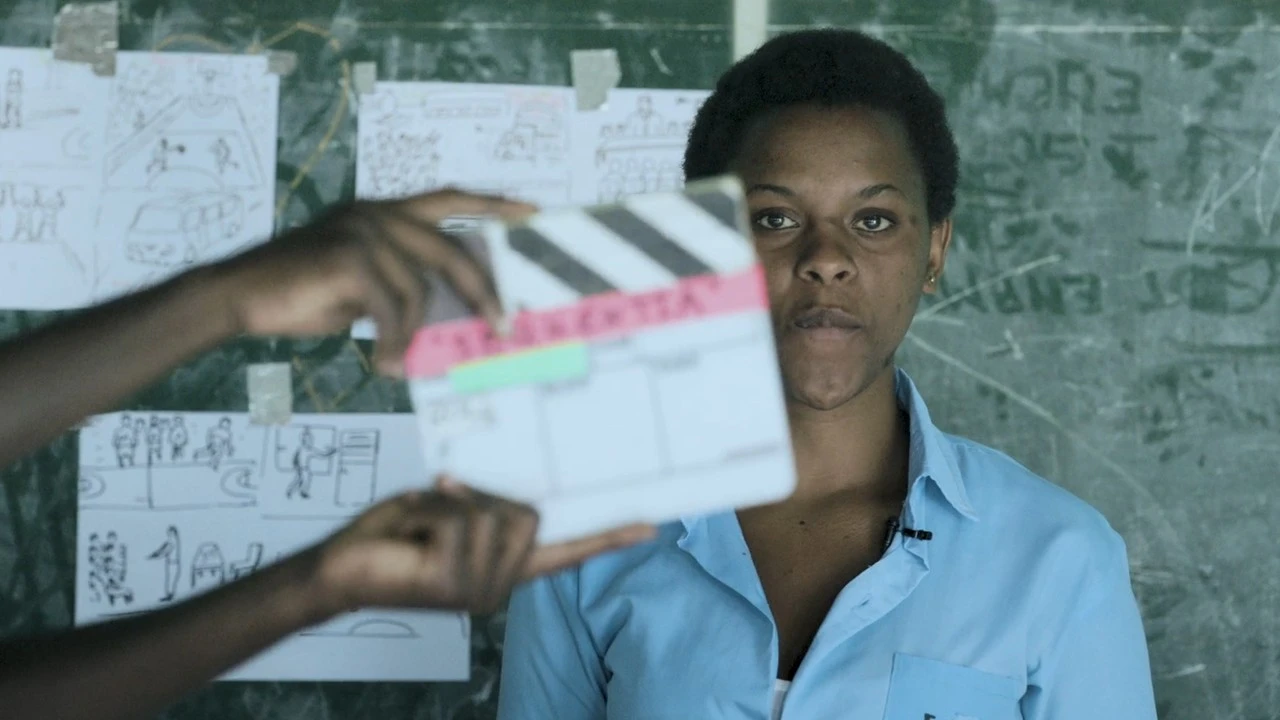
Christian Nyampeta, The Landing Between Us, 2020, film
Held on 12 Dec 2025
This second instalment of Cinema Commons, a research, programming and publishing project which explores how film articulates interpretive communities, fosters collective debate and devises proposals for common space, comprises three sessions with Rwandan artist, musician and film-maker Christian Nyampeta and Ècole du soir. The programme’s first session screens video works made by Nyampeta, while the second sets forth a dialogue on the creative processes of Ècole du soir. The third brings proceedings to a close with the screening of a film selected by the artist: Ousmane Sembène’s Guelwaar (1992).
The work of Christian Nyampeta encompasses pedagogies and community forms of knowledge production and transmission. His Ècole du soir (Evening School) is an art project conceived as a mobile space of collective learning and is named in homage to Ousmane Sembène (1923–2007), a pioneer of African cinema who defined his films as “evening classes” for the people, a medium of education and emancipation through culture.
The New York-based artist from Rwanda uses art and museums to create spaces of encounter and common learning that predate colonial education models. Via popular culture frames of reference like comics, music and film, Nyampeta develops dynamics and spaces from which to build experiences which redress the wounds of diaspora and its consequences; further, his work recovers, makes visible and heals — through a pedagogical and artistic process — the social divides of the African people. With Ècole du soir he also works on creations without authorship and uses the counter-ethnographic legacy of novelist and film-maker Ousmane Sembène as a tool to deconstruct the Western view of Africa.
Inside the framework of
Organised by
Museo Reina Sofía
First screening: from Thursday, 13, to Saturday, 15 November 2025 – 7pm
Second screening: Thursday, 11, and Friday, 12 December 2025 – 7pm
Accessible activity
This activity has two spaces reserved for people with reduced mobility
Agenda
jueves 13 nov 2025 a las 19:00
Session 1. Three Films by Christian Nyampeta
Christian Nyampeta. The Landing Between Us
South Korea, USA, Germany and Rwanda, 2020, DCP, colour, sound, original version in English with Spanish subtitles, 24’
Christian Nyampeta. A Long Trailer for a Film about Lovers in a Dangerous Spacetime
USA, Rwanda, Senegal and Palestine, 2021–2024, DCP, colour, sound, original version in English with Spanish subtitles, 40’
Kivu Ruhorahoza y Christian Nyampeta. Murmures
Senegal, 2025, DCP, colour, sound, original version in French with Spanish subtitles, 30’
—With a presentation by Christian Nyampeta
This session features three films made by Christian Nyampeta. The first, The Landing Between Us, foregrounds a trip the artist made to participate at the Gwangju Biennial in South Korea, taking in photographs, drawings and sound sketches which create identity, a sense of encounter. In A Long Trailer for a Film about Lovers in a Dangerous Spacetime, a calypso-music video clip initiates a journey of emotions and thoughts during a walk through New York’s streets. Voices, occurrences, memories of diaspora and African colonisation intersperse with the image of Nyampeta walking and with dialogues which end in a parody clip of disaffection. In the third and final film in the session, Murmures, a trip to Dakar uncoils a reflection on collective memory from the remembrance of an ancestor.
viernes 14 nov 2025 a las 19:00
Session 2. Open Dialogue with Christian Nyampeta and Ècole du soir
An evening with the shared and itinerant art work of Ècole du soir, with images, music and audiovisuals mixed live by Christian Nyampeta. The artistic project of Ècole du soir puts forward a common idea which conceives of pedagogical processes in popular art as an encounter and relationship between people. Therefore, the collective creates a sense of belonging and shared future in a world beat into shape by conflict, displacement and existential challenges.
sábado 15 nov 2025 a las 19:00
Session 3. Ousmane Sembène. Guelwaar
France, Germany, Senegal and USA, 1992, DCP, colour, sound, original version in French and Wolof with Spanish subtitles, 115’
A Catholic activist, Pierre Henri Thioune, known as Guelwaar, dies and his body is removed from the morgue after being mistakenly buried in a Muslim cemetery. The error gives rise to a series of religious and social conflicts which lay bare the conspicuous tensions in Senegal. Ousmane Sembène, a pioneer of African cinema, unfurls in this tragicomic film a mordant satire on the internal conflicts and dependency that still keep Africa decolonised with outside powers.
jueves 11 dic 2025 a las 19:00
Session 1 (Second screening). Three Films by Christian Nyampeta
Christian Nyampeta. The Landing Between Us
South Korea, USA, Germany and Rwanda, 2020, DCP, colour, sound, original version in English with Spanish subtitles, 24’
Christian Nyampeta. A Long Trailer for a Film about Lovers in a Dangerous Spacetime
USA, Rwanda, Senegal and Palestine, 2021–2024, DCP, colour, sound, original version in English with Spanish subtitles, 40’
Kivu Ruhorahoza y Christian Nyampeta. Murmures
Senegal, 2025, DCP, colour, sound, original version in French with Spanish subtitles, 30’
viernes 12 dic 2025 a las 19:00
Session 3 (Second screening). Ousmane Sembène. Guelwaar
France, Germany, Senegal and USA, 1992, DCP, colour, sound, original version in French and Wolof with Spanish subtitles, 115’

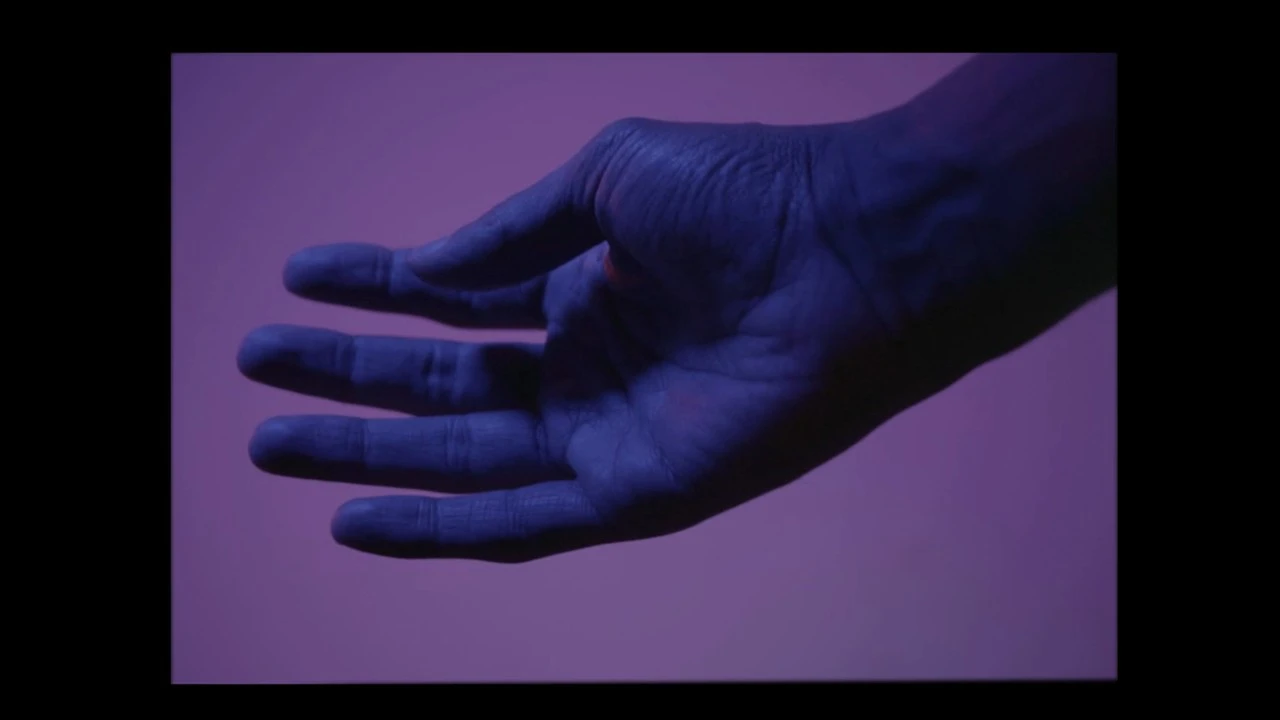
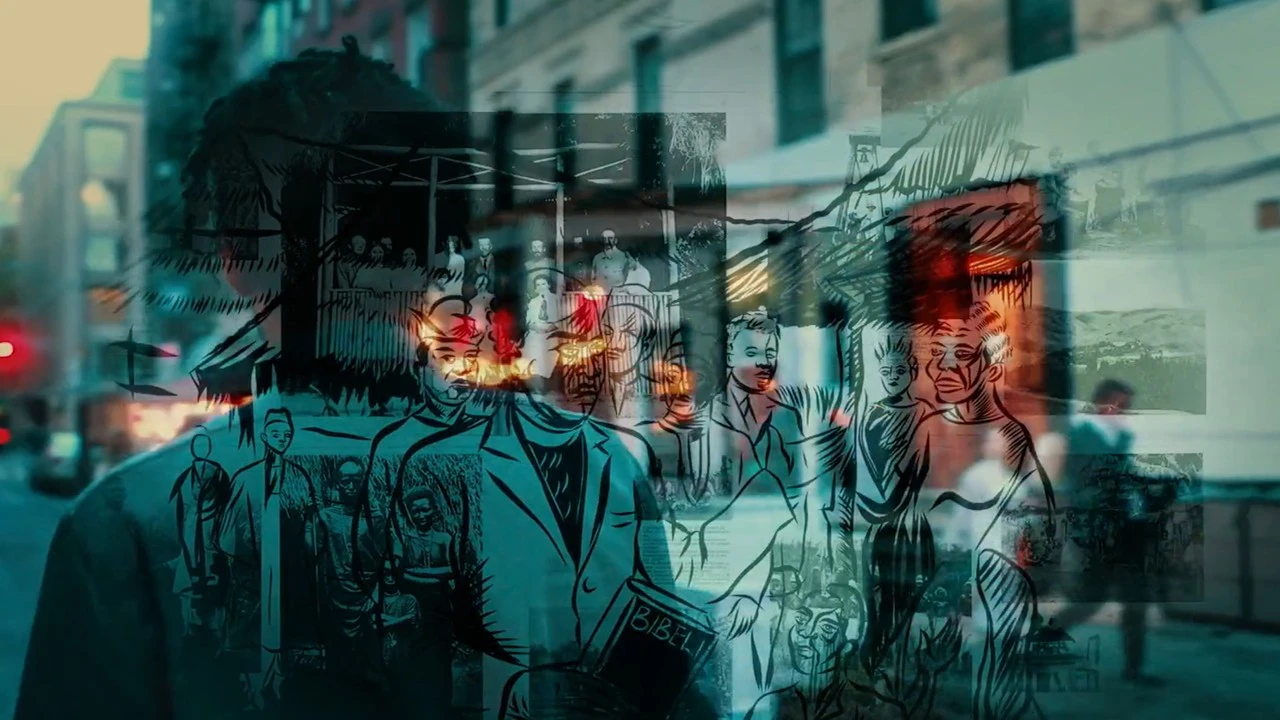
Activity within the program...
Cinema Commons
Cinema Commons is a research, programming and publishing project which explores how film and sound experiences articulate interpretive communities, fostering collective debate and devising proposals for common spaces. Constructed in two annual editions, this year it will explore three core strands: the alternative film society as a place of utopia and resistance, with film curators Miriam Martín and Ana Useros; the work of artist Christian Nyampeta and the École du soir, a learning collective focused on African diaspora and inspired by the trailblazing Senegalese film-maker Ousmane Sembène; and the union between activism and celluloid, machine and poetry, in the L’Abominable Laboratory, located on the outskirts of Paris.
The project addresses processes of socialisation and film’s potential beyond the image, with this edition bringing together different practices which explore film’s capacity to assemble and produce common spaces, understood in architectural, social and political terms. Film has always been a decisive tool in struggles for emancipation and, setting out from this genealogy, the proposals in this edition look to understand the role it can play in today’s cultural and political context, overcoming the dominant forms of representation and its modes of distribution to advance towards an ethics of life in common.
Ver programa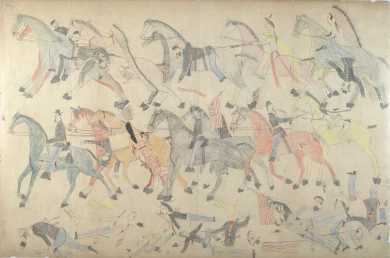
On the Art of Occupying Spaces and Curating Film Programmes
Past activity
On the Art of Occupying Spaces and Curating Film Programmes is a film programme overseen by Miriam Martín and Ana Useros, and the first within the project The Cinema and Sound Commons. The activity includes a lecture and two films screened twice in two different sessions: John Ford’s Fort Apache (1948) and John Gianvito’s The Mad Songs of Fernanda Hussein (2001).
“By virtue of a group of film curator enthusiasts, small plazas and vacant lots in Madrid’s Lavapiés neighbourhood became cinemas with the arrival of summer. The city streets made room for everyone: the local residents who came down with their seats tucked under their arms, or those who simply came across the Lavapiés Film Festival with no prior knowledge of it, but knowing how to recognise a free and convivial film screening, as enticing as light is to moths. The Festival’s film curators had to first reach a consensus with one another, by assembly, and then with others, addressing issues ranging from electricity to the transfer of rights to show the films.
Whereas the annually organised Festival resembled a camp, the weekly CSOA (Squatted Self-managed Social Centre) La Morada film society looked more like a settlement. In each squatted social centre, a micro civilisation is founded, and nestled among its infrastructures is always a film society. Why? We’ll see. A direct outcome of the 15M anti-austerity movement, this film society was contentless in form (the content, the films, were decided upon from session to session). Anyone was free to enter, and therefore free to curate the line-up, although not haphazardly — there was a method, ultimately devised so the community would not close, so it would never have one set image of itself.
Part of this method entailed relating the film from the following week to the recently viewed one, and the same method has gone into putting together this two-session programme. The Festival and the film society were, moreover, attempts at rectification: the festival logic and the very same film-club logic, according to which film boils down to an excuse for debating serious issues. There would be nothing to debate but much to ponder. For instance, about the manufacturing of enemies by a nation that chooses enemies in the world, with one film from the year the State of Israel was proclaimed and another from the year the Twin Towers were razed to the ground. The USA manufactures functional enemies and heroes and American cinema, in addition to showing us this, manufactures unforgettable characters: the Apache chief, Cochise, and mother courage, Fernanda Hussein. We’ll see”.
Miriam Martín and Ana Useros
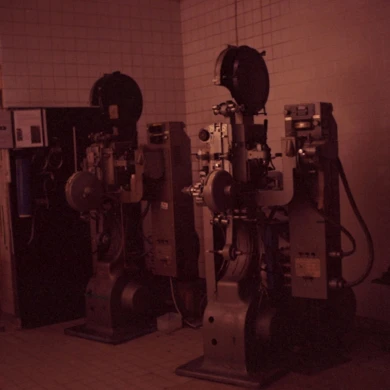
Long Live L’Abo! Celluloid and Activism
Past activity
The third instalment of Cinema Commons, a research, programming and publishing project which explores how film articulates interpretive communities, fosters collective debate and devises proposals for common spaces, presents L’Abominable, an artist- and film-maker-run independent film-lab founded in 1996 on the outskirts of Paris. The programme is structured around three sessions: a lecture-workshop on L’Abominable, conducted by film-makers Pilar Monsell and Camilo Restrepo; a session of short films in 16mm produced in L’Abominable; and the feature-length film Une île et une nuit (An Island and One Night), made by the Les Pirates des Lentillères collective.
Better known by the shortened version of L’Abo, the artist-run laboratory emerged in response to disappearing infrastructures in artisan film-making and endeavours to offer the creative community a self-managed space in which to produce, develop and screen films in analogue formats such as Super8, 16mm and 35mm. With this underpinning, L’Abo champions the aesthetic and political experimentation of analogue cinema opposite digital hegemony.
L'Abominable, more than a simple work tool, has become a space of artistic and social exchange which has knitted together a community. It is characterised by endowing technique with a poetic dimension, in a community that manufactures its own film devices, and situates pedagogy at its core — the film-makers and artists train one another on common ground. Further, it seeks to forge an opening to all experimental languages around celluloid, for instance installation and film performance, while constituting a place of preservation and conservation in the history of the medium.
L'Abominable is an example of how, at the height of the digital age, artists and film-makers are recovering cinematography and vindicating the production process in its entirety. This autonomy invents alternative routes in the industry as it creates new tools, develops other forms of expression and explores unknown cinematic territories.

Christian Nyampeta and the École du soir
Past activity
This second instalment of Cinema Commons, a research, programming and publishing project which explores how film articulates interpretive communities, fosters collective debate and devises proposals for common space, comprises three sessions with Rwandan artist, musician and film-maker Christian Nyampeta and Ècole du soir. The programme’s first session screens video works made by Nyampeta, while the second sets forth a dialogue on the creative processes of Ècole du soir. The third brings proceedings to a close with the screening of a film selected by the artist: Ousmane Sembène’s Guelwaar (1992).
The work of Christian Nyampeta encompasses pedagogies and community forms of knowledge production and transmission. His Ècole du soir (Evening School) is an art project conceived as a mobile space of collective learning and is named in homage to Ousmane Sembène (1923–2007), a pioneer of African cinema who defined his films as “evening classes” for the people, a medium of education and emancipation through culture.
The New York-based artist from Rwanda uses art and museums to create spaces of encounter and common learning that predate colonial education models. Via popular culture frames of reference like comics, music and film, Nyampeta develops dynamics and spaces from which to build experiences which redress the wounds of diaspora and its consequences; further, his work recovers, makes visible and heals — through a pedagogical and artistic process — the social divides of the African people. With Ècole du soir he also works on creations without authorship and uses the counter-ethnographic legacy of novelist and film-maker Ousmane Sembène as a tool to deconstruct the Western view of Africa.
Más actividades
![Tracey Rose, The Black Sun Black Star and Moon [La luna estrella negro y negro sol], 2014.](https://recursos.museoreinasofia.es/styles/small_landscape/public/Obra/AD07091_2.jpg.webp)
On Black Study: Towards a Black Poethics of Contamination
Monday 27, Tuesday 28 and Wednesday 29 of April, 2026 – 16:00 h
The seminar On Black Study: Towards a Black Poethics of Contamination proposes Black Study as a critical and methodological practice that has emerged in and against racial capitalism, colonial modernity and institutional capture. Framed through what the invited researcher and practitioner Ishy Pryce-Parchment terms a Black poethics of contamination, the seminar considers what it might mean to think Blackness (and therefore Black Study) as contagious, diffuse and spreadable matter. To do so, it enacts a constellation of diasporic methodologies and black aesthetic practices that harbor “contamination” -ideas that travel through texts, geographies, bodies and histories- as a method and as a condition.
If Blackness enters Western modernity from the position of the Middle Passage and its afterlives, it also names a condition from which alternative modes of being, knowing and relating are continually forged. From within this errant boundarylessness, Black creative-intellectual practice unfolds as what might be called a history of touches: transmissions, residues and socialities that unsettle the fantasy of pure or self-contained knowledge.
Situated within Black radical aesthetics, Black feminist theory and diasporic poetics, the seminar traces a genealogy of Black Study not as an object of analysis but as methodological propositions that continue to shape contemporary aesthetic and political life. Against mastery as the horizon of study, the group shifts attention from what we know to how we know. It foregrounds creative Black methodological practices—fahima ife’s anindex (via Fred Moten), Katherine McKittrick’s expansive use of the footnote, citation as relational and loving labour, the aesthetics of Black miscellanea, and Christina Sharpe’s practices of annotation—as procedures that disorganise dominant regimes of knowledge. In this sense, Black Study is approached not as a discrete academic field but as a feel for knowing and knowledge: a constellation of insurgent practices—reading, gathering, listening, annotating, refusing, world-making—that operate both within and beyond the university.
The study sessions propose to experiment with form in order to embrace how ‘black people have always used interdisciplinary methodologies to explain, explore, and story the world.’ Through engagements with thinkers and practitioners such as Katherine McKittrick, C.L.R. James, Sylvia Wynter, Christina Sharpe, Fred Moten, Tina Campt, Hilton Als, John Akomfrah, fahima ife and Dionne Brand, we ask: What might it mean to study together, incompletely and without recourse to individuation? How might aesthetic practice function as a poethical intervention in the ongoing work of what Sylvia Wynter calls the practice of doing humanness?

Intergenerationality
Thursday, 9 April 2026 – 5:30pm
This series is organised by equipoMotor, a group of teenagers, young people and older people who have participated in the Museo Reina Sofía’s previous community education projects, and is structured around four themed blocks that pivot on the monstrous.
The third session gazes at film as a place from which to dismantle the idea of one sole history and one sole time. From a decolonial and queer perspective, it explores films which break the straight line of past-present-future, which mix memories, slow progress and leave space for rhythms which customarily make no room for official accounts. Here the images open cracks through which bodies, voices and affects appear, disrupting archive and questioning who narrates, and from where and for whom. The proposal is at once simple and ambitious: use film to imagine other modes of remembering, belonging and projecting futures we have not yet been able to live.

Remedios Zafra
Thursday March 19, 2026 - 19:00 h
The José Luis Brea Chair, dedicated to reflecting on the image and the epistemology of visuality in contemporary culture, opens its program with an inaugural lecture by essayist and thinker Remedios Zafra.
“That the contemporary antifeminist upsurge is constructed as an anti-intellectual drive is no coincidence; the two feed into one another. To advance a reactionary discourse that defends inequality, it is necessary to challenge gender studies and gender-equality policies, but also to devalue the very foundations of knowledge in which these have been most intensely developed over recent decades—while also undermining their institutional support: universities, art and research centers, and academic culture.
Feminism has been deeply linked to the affirmation of the most committed humanist thought. Periods of enlightenment and moments of transition toward more just social forms—sustained by education—have been when feminist demands have emerged most strongly. Awareness and achievements in equality increase when education plays a leading social role; thus, devaluing intellectual work also contributes to harming feminism, and vice versa, insofar as the bond between knowledge and feminism is not only conceptual and historical, but also intimate and political.
Today, antifeminism is used globally as the symbolic adhesive of far-right movements, in parallel with the devaluation of forms of knowledge emerging from the university and from science—mistreated by hoaxes and disinformation on social networks and through the spectacularization of life mediated by screens. These are consequences bound up with the primacy of a scopic value that for some time has been denigrating thought and positioning what is most seen as what is most valuable within the normalized mediation of technology. This inertia coexists with techno-libertarian proclamations that reactivate a patriarchy that uses the resentment of many men as a seductive and cohesive force to preserve and inflame privileges in the new world as techno-scenario.
This lecture will address this epochal context, delving into the synchronicity of these upsurges through an additional parallel between forms of patriarchal domination and techno-labor domination. A parallel in which feminism and intellectual work are both being harmed, while also sending signals that in both lie emancipatory responses to today’s reactionary turns and the neutralization of critique. This consonance would also speak to how the perverse patriarchal basis that turns women into sustainers of their own subordination finds its equivalent in the encouraged self-exploitation of cultural workers; in the legitimation of affective capital and symbolic capital as sufficient forms of payment; in the blurring of boundaries between life and work and in domestic isolation; or in the pressure to please and comply as an extended patriarchal form—today linked to the feigned enthusiasm of precarious workers, but also to technological adulation. In response to possible resistance and intellectual action, patriarchy has associated feminists with a future foretold as unhappy for them, equating “thought and consciousness” with unhappiness—where these have in fact been (and continue to be) levers of autonomy and emancipation.”
— Remedios Zafra

ARCO2045. The Future, for Now
Saturday 7, March 2026 - 9:30pm
The future, its unstable and subjective nature, and its possible scenarios are the conceptual focus of ARCOmadrid 2026. A vision of the future linked to recent memory, a flash of insight into a double-edged sword. This year's edition, as in the previous two, will once again hold its closing party at the Reina Sofia Museum. This time, the star of the show is Carles Congost (Olot, Girona, 1970), one of the artists featured in the new presentation of the Collections recently inaugurated on the 4th floor of the Sabatini Building.
Carles Congost, with his ironic and timeless gaze, is responsible for setting the tone for this imperfect future, with a DJ session accompanied by some of his works in the Cloister on the first floor of the Sabatini Building of the Museo on the night of Saturday 7 March.

27th Contemporary Art Conservation Conference
Wednesday, 4, and Thursday, 5 March 2026
The 27th Contemporary Art Conservation Conference, organised by the Museo Reina Sofía’s Department of Conservation and Restoration, with the sponsorship of the Mapfre Foundation, is held on 4 and 5 March 2026. This international encounter sets out to share and debate experience and research, open new channels of study and reflect on conservation and the professional practice of restorers.
This edition will be held with in-person and online attendance formats, occurring simultaneously, via twenty-minute interventions followed by a five-minute Q&A.